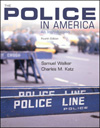 |  The Police in America, 4/e Samuel Walker,
University of Nebraska
Charles M. Katz,
Arizona State University-West
Police Problems Police Discretion
Chapter Overview| Exercising discretion is one of the most important elements in police officer decision-making. Officers routinely use discretion in deciding, for example, to make an arrest, stop a vehicle, or become involved in a high-speed pursuit. While officers routinely make judgments that affect the outcomes of various events, their decision-making is limited in several respects.
This chapter first defines and explains the underlying sources of discretion. Next, factors that influence discretionary decisions, such as situational factors and departmental policies, are discussed. Problems associated with the use of officer discretion are also addressed. The chapter concludes with an examination of strategies for controlling discretion and the impact of administrative rulemaking on police officer decision-making.
|
|



 2002 McGraw-Hill Higher Education
2002 McGraw-Hill Higher Education